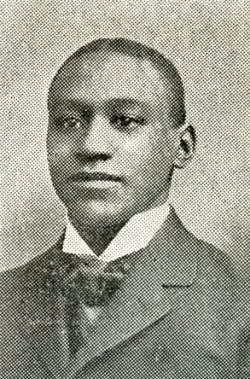William Griffin… chess pioneer in 1900s
Owen Clarkin sent me notice of a Black chess player from the 1900s named William E. Griffin. He was born in Missouri and apparently had achieved moderate success. Griffin mentioned that he did not know of many players of his race, but James McCune Smith and Theophilus Thompson had already come and gone by the time he took up the royal game.
Perhaps there were other but given that information flow was so slow in those days, he may have bee limited in his access to news. Not much is know of his play and he games were not recorded, but he may have been a club level. Nevertheless, The Chess Drum introduces William E. Griffin who will be added as “Master Emeritus” on the list of Drum Majors in the African Diaspora!
The following entry appears to have been a biography from page 34 of the February 1905 American Chess Bulletin.
‘William E. Griffin is the name of one of the few members of the colored race known to be enthusiastic in the pursuit of chess. He hails from Kansas City, Mo., and is a participant in the pending Rice Gambit tournament of the Pillsbury National Correspondence Chess Association, and in this connection his portrait is used in the supplement to the February number. Readers of the Bulletin will no doubt relish a few particulars concerning the career of this interesting exponent of the game and accordingly the following biographical data supplied by him at the solicitation of the editors are presented.
“I play chess because of the pure intellectual discipline and high aesthetic pleasure which the game affords. I do not know a great many of my race who are devotees of the Royal Game.”

William E. Griffin on page 101 of The Rice Gambit by H. Keidanz (New York, 1905).
Born in the backwoods of Missouri, near the town of Fayette, on 17 May 1874. Griffin, at the age of 13, moved to Kansas City and went through the public schools there. He finished his education at the Kansas State University and is now engaged in the work of teaching school. A little more than three years ago, he learned the moves of the game and is now, to use his own words, “a burning chess enthusiast and an unwearying student of the game”. He boasts possession of a working library of some 25 volumes, which, however, he considers but a beginning.
A few months after taking up the game he became a PNCCA member but failed to reach the semi-finals that year, his score comprising three wins and as many losses. In the eighth annual tournament he did succeed in attaining to semi-final rank and was awarded the usual bronze medal. In the Rice Gambit tournament he has so far not lost a game and feels sure of entering the final round.
Besides his other accomplishments, Griffin claims to be able to play blindfold chess as easily as over the board and thinks that, with a little practice, he can conduct several games simultaneously. “I play chess”, writes Griffin, “because of the pure intellectual discipline and high aesthetic pleasure which the game affords. I do not know a great many of my race who are devotees of the Royal Game. In this city, however, it is the favorite pastime of a certain class, but I am not familiar with conditions in other cities. Wherever I go I introduce the game and find that it is is taken up readily.’
Griffin won sixth prize in the Rice Gambit tournament, as reported on page 375 of Twenty Years of the Rice Gambit (New York, 1916). His prize was $15.00, a decent sum in those days.
Link: https://www.chesshistory.com/winter/#7230._Yates_v_Randall

Very good and humbling story! We have 2 respect those in the past because they helped 2 pave the way 4 for future! Please Educate All Children Everyday! PEACE!